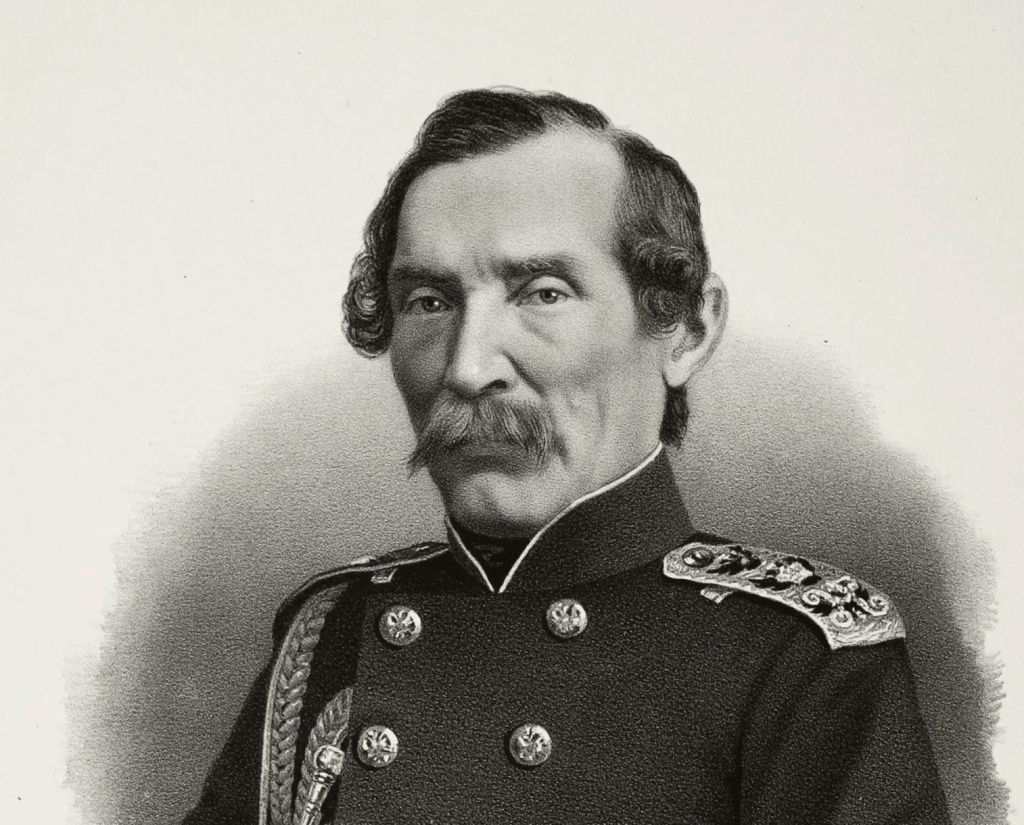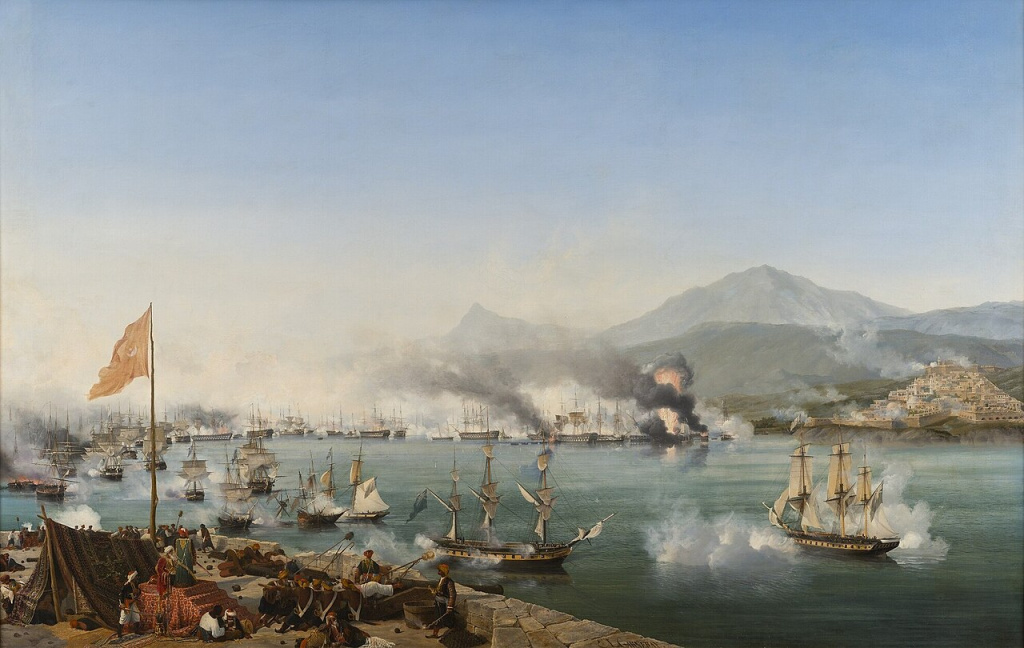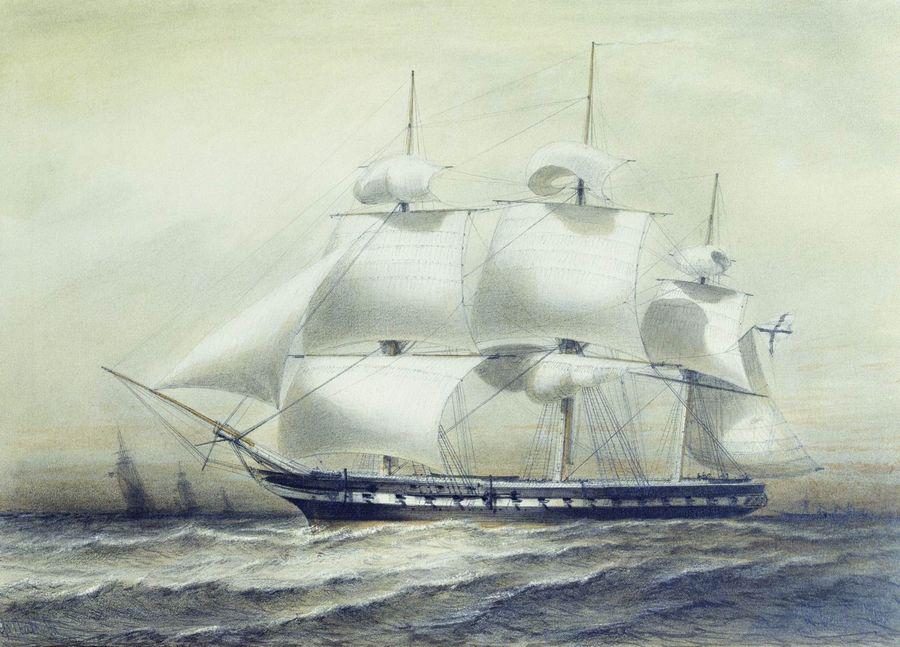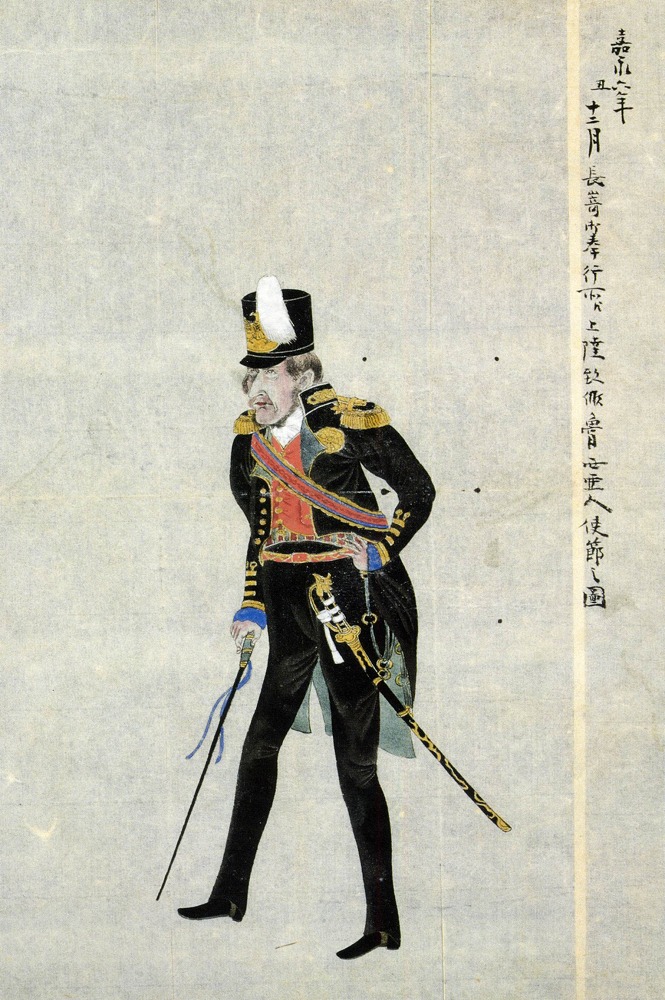
Proud of Our People! Admiral Putyatin, Seafarer and Diplomat
/ Главная / Russkiy Mir Foundation / Publications / Proud of Our People! Admiral Putyatin, Seafarer and DiplomatProud of Our People! Admiral Putyatin, Seafarer and Diplomat

Admiral Yevfimiy Putyatin. Photo credit: wikipedia.org
A few years ago, a memorial sign was set up on the shore of Sovetskaya Gavan Bay, a town in Khabarovsk Krai, It reads: "To the glorious son of the Russian state, its defender in the Far East, the founder of the first fortified area on the shore of Imperatorskaya (Sovetskaya) Gavan Bay, Admiral Yevfimiy Putyatin." Three cities have monuments to the Russian admiral not only in Russia, but also in Japan, There is even a museum dedicated to Yevfimiy Putyatin and his expedition.
Disciple of the renowned fleet commander
Yevfimiy Putyatin, the Russian admiral, statesman, and diplomat, was born in St. Petersburg on November 20, 1803. His father was a naval officer, so his son's career was decided from the time of his birth. However, Yevfimiy Putyatin figured it out later. He was a feeble and unhealthy child and even vowed to become a monk if recovered. Nevertheless, his parents sent him to the Naval Cadet Corps. Then, sailing on training vessels, a keen interest in studies, and his first achievements contributed to his decision. The young man chose his path and even excelled in the final exams. He received the rank of midshipman. Later that year he was commissioned to the frigate "Kreiser" setting off on a circumnavigation of the world under the command of the famous fleet commander Mikhail Lazarev.
The frigate was leaving Kronstadt for Rio de Janeiro, then to the Cape of Good Hope, and to Russian America that was still owned by the Russian Empire at that time. Then the plan was to visit Cape Horn and return to Kronstadt. The voyage took three years in total. At first, Mikhail Lazarev treated midshipman Putyatin with caution thinking that he had joined the frigate under protection. However, having observed the young sailor's diligence and determination during the long voyage, commander Lazarev softened his attitude to Mr. Putyatin. Besides, his fluent English was of great use in Russian America as midshipman Putyatin was able to communicate with local farmers and buy food for the Russian colony.
Having returned from a challenging and dangerous circumnavigation, many of the crew members were promoted and awarded. Mikhail Lazarev was promoted to Captain 1st rank, and Yevfimiy Putyatin was honored with an order and a double salary. When Mr. Lazarev was appointed captain of the battleship "Azov", he invited Mr. Putyatin to be his midshipman as he had full confidence in him already. Battleship "Azov" became the hero fighting the Turks at the Battle of Navarino in the Mediterranean Sea. It was also the first Russian vessel to be awarded the St. George flag as ensign.
After that, Mr. Putyatin's career was advancing rapidly. By the time he was 28 years old, he had completed 18 naval campaigns, and the Order of St. George of the IV Class complemented the Order of Vladimir of the IV Class for his participation in the Battle of Navarino. Later, Mr. Lazarev recommended him to be appointed commander of the Black Sea frigate "Agatopol". As such, he participated in landing operations to subdue the mountaineers on Cape Adler, as well as in Tuapse and Shapsukhu. His leg was severely wounded in one of the battles but he didn't withdraw from the battle. He was promoted to captain 1st rank for successful operations.

The Naval Battle of Navarino by Ambroise Louis Garneray,1827. Photo credit: wikipedia.org
Shutting the door on pirates
In 1841 Putyatin went to England. He intended to improve his health and negotiate the acquisition of steamships for the Black Sea Fleet. This mission along with some confidential assignments seemed to be very successful as in 1842 Emperor Nicholas I sent Mr. Putyatin on a diplomatic errand to Persia to establish trade relations.
The first task was to subdue the Turkmen pirates operating in the Caspian Sea. Mr. Putyatin dealt with the issue quickly and strongly. A military base was established in the largest bay of the Caspian Sea, shutting the door on the sea outlaws. Thereafter, the Russian diplomat had a much easier time persuading the Persian Shah to lift restrictions on trade with Russia and even establish steamship navigation between Persia, the Caucasus, and the mouth of the Volga River.
A year later, Yevfimiy Putyatin developed a plan for an expedition to the eastern maritime borders of China and Japan. His outline to Nicholas I was as follows, "It would be a prudent decision to explore our eastern border with China... So far we know that there is no reliable port along the entire eastern shore. We do not have any information about the bay between the mainland and Sakhalin. Finding a port in this region that is more convenient than Okhotsk... is a very useful issue, and therefore it would be reasonable to commission an expedition to examine and describe those little-known shores. It could be possible to combine a new attempt to establish communication with Japan with the navigation of vessels in the Sea of Okhotsk."
Read also: Proud of Our People! Nikolay Przhevalsky, Explorer of Central Asia
Heading to the Land of the Rising Sun on the frigate "Pallada"
Preparation started but then the expedition was canceled based on the Minister of Finance's recommendation. The Tsarist government decided to open diplomatic relations with Japan only in 1852. The Russians learned of the forthcoming American expedition to Japan. Until the mid-19th century, the country used to be completely closed to foreigners, and all aliens who entered Japan were executed. At that point, however, the Japanese government was willing to end its centuries-long isolation and establish diplomatic relations with other countries. Moreover, trade was not the only issue. Border delimitation was also at stake. It was decided to send Vice-Admiral Putyatin there.
He took a meticulous approach to the crew formation for the planned expedition. Thus, Ivan Unkovsky, captain 2nd rank, one of the best trainees of the late Mikhail Lazarev, commanded the frigate "Pallada". The crew also included the writer Ivan Goncharov, who wrote his memoirs about the voyage under the title "Frigate Pallada".

Frigate Pallada by Alexey Bogolyubov, 1847
First, Mr. Putyatin intended to recruit the poet Apollon Maykov as his secretary. However, the latter declined the offer and recommended his friend Mr. Goncharov to write a report on the expedition. As Ivan Goncharov recalled later, it was impossible for him to understand how all of a sudden such a "lazy and comfort-addicted" metropolitan dweller as him felt such a passion for traveling. So, he pursued this assignment very persistently. However, Mr. Goncharov was rather discouraged by a three-week voyage from Kronstadt to Portsmouth and thought of returning home. The short trip had brought a lot of hardships. Three of Pallada's sailors were diagnosed with cholera over that time. The frigate was hit by a horrible storm, then it ran aground and could not enter the English Bay for ten days. Odd as it may seem, his laziness was the reason that stopped Mr. Goncharov from leaving everything behind. The idea of traveling across Europe with his luggage, bundles of books, and manuscripts of his novel "Oblomov" made him feel terrified. If only the writer had known that his trip from Japan would require him to travel across the whole of Russia and he would have to travel 7,000 miles along the coastline with virtually no roads or people! However, at that point, he certainly had no idea of the above and preferred to stay in the expedition.
Ivan Goncharov described the expedition's chief, Vice-Admiral Putyatin, as follows, "Whenever he sees someone idle, he will suggest them something to do, e.g. to write a paper ... or read a book; he will even take the trouble to choose the book in his library and point out what to read or translate from it". Even these few lines portray a "father to soldiers", or rather, to sailors, who cared about their both physical and spiritual well-being. By the way, during the voyage, Mr. Putyatin succeeded in mastering the Dutch language, which served as a negotiation language for the Japanese.
How the tsunami contributed to the treaty with Japan
Unfortunately, the frigate "Pallada" was not ready for such a long voyage. It had to stop for long repairs in almost every port. As a result, Mr. Putyatin had to request another vessel from St. Petersburg. Nevertheless, the "Pallada" did reach Japan and anchored in the port of Nagasaki. It was here that the Russian sailors encountered the dodgy Japanese bureaucracy. The Japanese refused to allow the foreigners to go ashore, and the negotiations were delayed in every possible way. Having arrived at the beginning of August, the mission members learned that some important officials left from the Japanese capital to visit them in November only. Furthermore, their journey would take at least a month.
Mr. Putyatin did not want to waste time and went to Manila, then to Korea and Shanghai, surveying the eastern coastland along the way. Several bays and islands were discovered during this campaign. Meanwhile, the Crimean War broke out in Russia and the negotiations with Japan became even more urgent due to the risk that England would be able to reach an agreement on having its military bases in the area.
It was more than a year since his arrival in Nagasaki when Mr. Putyatin reached the port of Shimoda aboard the frigate "Diana", which had been sent from St. Petersburg. In early December 1854, there was a strong earthquake in Shimoda Bay, followed by a tsunami. First, the "Diana" broke its mooring and was nearly smashed against the coastal rocks. Then a powerful funnel formed around the vessel and it made 40 full turns around its axis within half an hour! At the same time, a huge wave came crashing ashore, wiping out everything in its path. Unfortunately, the frigate "Diana" leaked and sank. The sailors survived, and once ashore, began to rescue the locals by removing debris and pulling people out from under the wreckage. Only 60 of the 1,000 houses survived in Shimoda.
It seems there was some luck in this misfortune. The Russians' commitment must have impressed the Japanese. The local authorities even agreed to help them build a new vessel to get back to their homeland. Moreover, in January, the first Treaty of Amity and Commerce between Russia and Japan was finally signed in the city of Shimoda. Today it is known as the Treaty of Shimoda.
In 1857, Yevfimiy Putyatin headed a diplomatic mission to China to secure a trade treaty as well. However, it was not successful as the locals believed that Russia supported the plundering policy of England and France. However, the second trip to Japan in the same year culminated in the signing of an additional treaty on commerce. Nevertheless, Mr. Putyatin did not give up on China. He returned there again in 1858. Yevfimiy Putyatin was the first European ambassador to sign a trade treaty that opened access to the Chinese hinterlands for Russian missionaries. Finally, in the same year, Mr. Putyatin visited Japan for the third time and signed another treaty that opened up new convenient ports for Russian vessels and permitted the construction of Russian Orthodox churches. By the way, when the Admiral passed away, his daughter Olga renounced her worldly life and went to Tokyo to serve in the local Orthodox church.

Admiral Putyatin through the eyes of the Japanese (1853). Photo credit: wikipedia.org
The final years of Admiral Putyatin's life were not that vibrant. His unexpected appointment as Minister of Education proved to be a failure. Mr. Putyatin imposed tuition fees, which limited access to education for the lower-middle-class young. Student unrest broke out, and Mr. Putyatin resigned having realized his mistake and incompetence.
He also headed a special committee responsible for establishing the Obukhov Machine Building Plant in St. Petersburg. The plant was finally founded in May 1863.
In May 1883, Yevfimiy Putyatin was honored with the highest Russian award - the Order of St. Andrew. In October of the same year, he passed away. Mr. Putyatin was buried together with his wife in the Kiev-Pechersk Lavra according to his will.
Today monuments to Admiral Putyatin are carefully preserved in the Japanese cities of Fuji, and Shimoda, as well as the village of Heda. There is also a museum in the village dedicated to Mr. Putyatin's expedition and the Treaty of Shimoda.
New publications

 Mikhail Kalatozov, a director who transformed the world of cinematography in many ways, was born 120 years ago. He was a Soviet film official and a propagandist. Above all, he was capable of producing movies that struck viewers with their power and poetic language.
Mikhail Kalatozov, a director who transformed the world of cinematography in many ways, was born 120 years ago. He was a Soviet film official and a propagandist. Above all, he was capable of producing movies that struck viewers with their power and poetic language.  Ukrainian authorities have launched a persecution campaign against the canonical Ukrainian Orthodox Church (UOC), the biggest one in the country's modern history. Over the past year, state sanctions were imposed on clergy representatives, searches were conducted in churches, clergymen were arrested, criminal cases were initiated, the activity of the UOC was banned in various regions of the country, and monasteries and churches were seized.
Ukrainian authorities have launched a persecution campaign against the canonical Ukrainian Orthodox Church (UOC), the biggest one in the country's modern history. Over the past year, state sanctions were imposed on clergy representatives, searches were conducted in churches, clergymen were arrested, criminal cases were initiated, the activity of the UOC was banned in various regions of the country, and monasteries and churches were seized.  When Nektary Kotlyaroff, a fourth-generation Russian Australian and founder of the Russian Orthodox Choir in Sydney, first visited Russia, the first person he spoke to was a cab driver at the airport. Having heard that Nektariy's ancestors left Russia more than 100 years ago, the driver was astonished, "How come you haven't forgotten the Russian language?" Nektary Kotlyaroff repeated his answer in an interview with the Russkiy Mir. His affinity to the Orthodox Church (many of his ancestors and relatives were priests) and the traditions of a large Russian family brought from Russia helped him to preserve the Russian language.
When Nektary Kotlyaroff, a fourth-generation Russian Australian and founder of the Russian Orthodox Choir in Sydney, first visited Russia, the first person he spoke to was a cab driver at the airport. Having heard that Nektariy's ancestors left Russia more than 100 years ago, the driver was astonished, "How come you haven't forgotten the Russian language?" Nektary Kotlyaroff repeated his answer in an interview with the Russkiy Mir. His affinity to the Orthodox Church (many of his ancestors and relatives were priests) and the traditions of a large Russian family brought from Russia helped him to preserve the Russian language.

 The leaders of the Friends of the Great Russia cultural association (Amici Della Grande Russia) in Italy believe that the Western policy of abolishing Russian culture in Europe has finally failed. Furthermore, it was doomed to failure from the beginning.
The leaders of the Friends of the Great Russia cultural association (Amici Della Grande Russia) in Italy believe that the Western policy of abolishing Russian culture in Europe has finally failed. Furthermore, it was doomed to failure from the beginning.  Name of Vladimir Nemirovich-Danchenko is inscribed in the history of Russian theater along with Konstantin Stanislavski, the other founding father of the Moscow Art Theater. Nevertheless, Mr. Nemirovich-Danchenko was a renowned writer, playwright, and theater teacher even before their famous meeting in the Slavic Bazaar restaurant. Furthermore, it was Mr. Nemirovich-Danchenko who came up with the idea of establishing a new "people's" theater believing that the theater could become a "department of public education."
Name of Vladimir Nemirovich-Danchenko is inscribed in the history of Russian theater along with Konstantin Stanislavski, the other founding father of the Moscow Art Theater. Nevertheless, Mr. Nemirovich-Danchenko was a renowned writer, playwright, and theater teacher even before their famous meeting in the Slavic Bazaar restaurant. Furthermore, it was Mr. Nemirovich-Danchenko who came up with the idea of establishing a new "people's" theater believing that the theater could become a "department of public education."  "Russia is a thing of which the intellect cannot conceive..." by Fyodor Tyutchev are famous among Russians at least. December marks the 220th anniversary of the poet's birth. Yet, he never considered poetry to be his life's mission and was preoccupied with matters of a global scale. Mr.Tyutchev fought his war focusing on relations between Russia and the West, the origins of mutual misunderstanding, and the origins of Russophobia. When you read his works today, it feels as though he saw things coming in a crystal ball...
"Russia is a thing of which the intellect cannot conceive..." by Fyodor Tyutchev are famous among Russians at least. December marks the 220th anniversary of the poet's birth. Yet, he never considered poetry to be his life's mission and was preoccupied with matters of a global scale. Mr.Tyutchev fought his war focusing on relations between Russia and the West, the origins of mutual misunderstanding, and the origins of Russophobia. When you read his works today, it feels as though he saw things coming in a crystal ball...